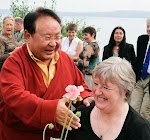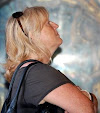Written for Ally at the Spiritual Care Centre and Dzogchen Beara...
The death of a loved one can be prepared for, can be talked about in readiness for the great event…but it is hard to predict the immediate reaction to losing that person. We will all have different expectations of how we will cope and we usually manage to muddle through somehow. The busyness of funerals and the organisation of death’s details keep us occupied for a few days and we get by on sheer adrenaline but even those times are punctured by great waves of despair that rob us of rational thought…when all we can focus on is breathing the next breath without screaming.
The days after the funeral consume us; we awake to a tremendous emptiness, everything seems flat and featureless and bleak. Friends and family want to help but often don’t know how to…and so we put on a brave face and crumble into pieces in private. If the loved one was a partner then the loss is there every time you wake up alone and go to sleep alone; there is no longer the warmth of an enveloping embrace to wash away your fears and anxieties; and sometimes you forget…just for a moment perhaps…maybe driving home from work or turning to smile at an empty space …you forget they’re dead and the pain is fresh and raw and unbearable. Ridiculous things cause the pain: a song you both loved; a TV programme you always watched together; a flower blooming in the garden that they will never see…
So what could help us to endure the loss? I think that will always depend upon who have you lost and how you lost them. For most people, the chance to share memories is important…to feel that you aren‘t expected to forget the dead; to talk about our fears and the moments leading up to the death, the illness, the happy times…we need the opportunity to just sit in silence with someone who makes no demands on us to talk if we don’t want to. We need someone who doesn’t turn away from us and who keeps checking in on us…a voice at the end of a phone who keeps in touch. We need permission to feel that we can laugh without everyone assuming we’re over our loss; to find joy in sunsets and smiles while still holding on to the love that gave meaning to our lives…all I know is that this journey is as individual as the bereaved person themselves; there are no maps to follow as we learn to live with the loss that has stolen away our future and our hopes.
All of which sounds dreadfully unhelpful for anyone wanting a practical way of coping…but maybe there are a few things that might help.
When I returned to Dzogchen Beara after Gordon died, I was returning to friends and a place that we had both loved deeply. Those relationships are what count…if people come to find peace then there is peace in abundance. If they come to find comfort then they need the human dimension: the smiles and hugs and warmth that the people of Dzogchen Beara radiate; the little kindnesses that count whether it’s eating with the community or having someone make sure you have tea and biscuits when you arrive. Regardless of the jaw-dropping scenery of sky and sea, the heart of Dzogchen Beara is its people: the welcome in the shop, the greetings when you are walking around…the sheer love of the place that makes it so very special. I know that was what we missed when we were in England and what we looked forward to most when we came back “home”
Perhaps I might have been left on my own for too much of the time when I returned without Gordon: I must admit that I missed the stream of visitors that we’d had before…the popping in for a chat or a coffee. Perhaps people stayed away because they didn’t want to intrude…perhaps that’s why I wanted to do a last film piece for the Centre: to show that I still had something to say…that to survive is sometimes just as courageous as to die fearlessly as Gordon did. Whatever the reason, it was a plea to still be thought of as part of the community, a need to belong to something that mattered.
Rinpoche talks about the need to be present with the dying because they face losing everything; the bereaved lose everything yet are expected to carry on after just a few weeks. Everyone who works at DzB could be made aware of those who visit after a bereavement so that they too can be present in every encounter…if the volunteers change between visits, you feel a bit lost and search around for faces that recognise you and know your story but maybe that’s a bit of a tall order in the real world.
Younger folk or teenagers might enjoy being befriended or invited to evening sessions in the Hostel. Courses on “Facing Loss” suggest surrendering your feelings and opening your freshly butchered heart to strangers; just the chance to be normal for a short time with people your age who know about your loss but won’t make a big deal out of it, is a blessing for those who don’t have the mechanisms to cope yet. Open, friendly people were important to our children after Gordon died…no pressure to talk unless they wanted to; no expectations of what would happen if they did.
So, finally, it seems to boil down to the courage to be rejected again and again until the bereaved take the leap of faith needed to accept help in whatever form they need…and we need others to show that courage for us until we are ready; not to turn away with a sigh of relief when we refuse the second time but to continue to be there for us for as long as it takes (whether we are at DzB or back home) We need you to realise that our future has been wiped clean; that we stand at a crossroads with no map to guide us and no loved one to comfort us…we are lost and alone and terrified. Give us time and understanding; give us love and companionship when we think we have none; lend us your hearts while ours are broken and be patient with us. One day, we will have the strength to try to stand on our own…be our supporting arm while we regain the confidence to walk on our new path.



No comments:
Post a Comment